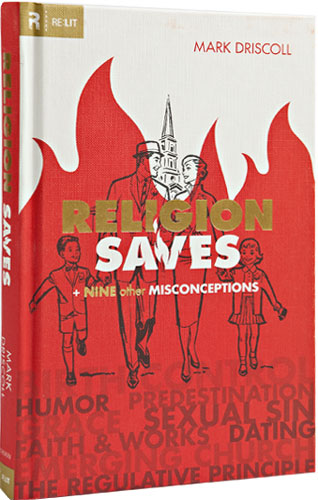Latest
-
Objections to the Christian Faith from the Unchurched and De-Churched
 Tue Dec 02, 2014
Tue Dec 02, 2014
by Resurgence -
Craig Groeschel: We Innovate for Jesus
 Tue Oct 14, 2014
Tue Oct 14, 2014
by Resurgence -
Mark Driscoll: Revelation
 Tue Oct 07, 2014
Tue Oct 07, 2014
by Resurgence -
RESURGENCE LEADERSHIP #034: JOHN PIPER, WHY I TRUST THE SCRIPTURES, PART 2
 Tue Sep 30, 2014
Tue Sep 30, 2014
by Resurgence -
Resurgence Leadership #033: John Piper, Why I Trust the Scriptures, Part 1
 Tue Sep 23, 2014
Tue Sep 23, 2014
by Resurgence

Archives
Ten Commandments for Sanctifying Comedy

There’s a time for laughter (Eccl. 3:4), and April Fools’ is one of those times. Here are 10 guidelines for enjoying humor without crossing the line.
April Fools’ Day may not be an official holiday, but it is officially a great day to crack a joke, prank your friends, and laugh at yourself.
To help you glorify God and enjoy him today, we want to share some basic rules of engagement before you wildly fire your funny guns. Our hope is that these 10 commandments—adapted from Religion Saves by Mark Driscoll—for sanctifying comedy will provide some bumper pads for your sense of humor to keep you from going in the gutter.
1. Don’t mock God
God is great. God is not a sinner. God is not to be judged by us. God is God. Besides, God has a long history of getting the last laugh. So don’t mock God (Gal. 6:7).
2. Don’t mock everyone
If you mock your spouse, children, or your own mom, you are a dolt and not funny—no matter how many people laugh.
Don’t mock rape victims, abused children, battered women, and the like, because the point of prophetic irony is to bring sinners to repentance, not to bring victims to tears.
3. Don’t mock all the time
Only some of the Bible is funny, which means that most of our speech should be serious and that some of our speech should be humorous.
4. Don’t judge yourself by yourself
You’re not the standard of faith and life, so it’s not good to judge yourself by yourself (1 Cor. 4:3), no matter how funny you think you are.
God has a long history of getting the last laugh.
If someone in authority over you (e.g., boss, parent, pastor) tells you that you have crossed the line and need to apologize and grow up, then repent before you become the joke.
5. Don’t worry about getting tempered as you age
With age comes wisdom, if you are perceptive and humble enough to learn from your experiences. Therefore, as you age, you should do so graciously by becoming tempered, though not neutered.
6. Don’t keep picking on the same group of people
If you keep picking on the same group, eventually people will call you hateful, but if you pick on lots of groups, they will thankfully downgrade you to cruel or, if you are really blessed, maybe just to mean.
7. Don’t assume you know where the line is
The problem with comedy is that the line is different for everyone, and the line changes from one culture and subculture to the next. So remain teachable and flexible.
The point of prophetic irony is to bring sinners to repentance, not to bring victims to tears.
The painful truth is that you generally find the line of propriety only by crossing it, and when you do, make sure to apologize and repent.
8. Don’t forget to laugh at yourself—often
The best material is the stuff of your own life.
Tell stories about yourself, pointing out your imperfections, folly, self-righteousness, and the like before you turn your funny guns on anyone. By doing so you will reveal that your humor is not scorn but, rather, the acknowledgment of a common mess we are all in as sinners.
9. Make sure you know whom to mock
Psalm 1 does not look favorably at the unrighteous who mock the righteous. Mockery in and of itself is not a sin, but you have to make sure you know whom to mock and why.
10. Don’t overlook the importance of discernment
Discern when, where, and how to use prophetic humor.
Proverbs 26:4–5 advises, “Answer not a fool according to his folly, lest you be like him yourself. Answer a fool according to his folly, lest he be wise in his own eyes.” When a fool is hardhearted, to engage him is to end up descending to his level and becoming a fool who blurts out folly in angry defense.
No joke, get 25% off Religion Saves by Mark Driscoll today.
